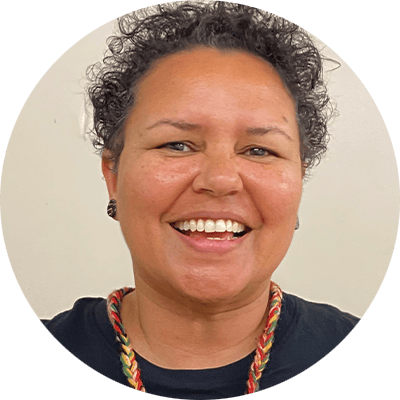When Jaqui Hughes travels to the Near Western Torres Strait to work on a project to improve local health outcomes, she knows it was meant to be.
“I come from a tribal group called Wagadagam from Mabuyag Island. The tribal elders of that region have invited me to come and to contribute to health advancement within communities of the near western region (Badu, Kubin, St Paul and Mabuyag) that I am related to. And that's such a wonderful honour,” the specialist kidney researcher and physician says.
“And that's not by accident, you know?” Professor Hughes is based in Darwin as Clinical Research Professor Aboriginal and Torres Strait Islander Health Advancement of Flinders University.
Her journey from school in Darwin to study medicine in Newcastle, to intern as a junior doctor in Sydney, returning to Darwin as a clinician and now leading research, is one she hopes will be the trajectory of many more Aboriginal and Torres Strait Islander people.
“When we’re intentional about creating good opportunities for our children to succeed at high school, to facilitate their access to university, to provide a good way to train them in medicine like the Flinders medical degree delivered on Country in the Territory, to provide scholarship opportunities and keep supporting opportunities for people to grow in experience, these things are not accidental. This is what we've designed it to do. This is not the exception, but the intended goal.”
Her expression of this destiny encapsulates her vision for Aboriginal and Torres Strait Islander people’s health outcomes.
“Wherever Australians live, they have the right to access high quality healthcare. It’s about health education, delivering research and understanding what people need,” she says.
“And it’s a really great cycle of learning, delivering, giving back, learning, delivering, giving back.”
Professor Hughes is a key member of the Flinders Rural and Remote Health team, a role she loves, although she bridles at any suggestion Aboriginal health outcomes are hindered by the remoteness of some communities.
“It depends on whose perspective. Remoteness is a strength, I think. But when we’re talking about the social-geographic gradients of how we record illness in this country, remoteness can be seen as a weakness. And so whose viewpoint are you valuing?
She sees providing services and care in some populations and not others a form of structural racism.
“Living on Country is so wonderful and something to be proud of. We need to be able to structure accessible healthcare that takes into account that those things shouldn't be a barrier.”
The most important thing that Australia could do to advance the health of Aboriginal and Torres Strait Islander people is address population health issues, Professor Hughes says. That means delivering the elements of good health of mothers and babies and young people in a way that invites people to readily engage with health services.
“Chronic kidney disease among adults is highly related to long-standing contributing conditions such as high blood pressure and diabetes, obesity and cardiovascular disease. Population health is so important because when we get that right, we can reduce the burden of all those conditions.”
While Professor Hughes works on those long-term goals, she is also dealing with the reality of the present – and that is a crisis. Data from the Australia and New Zealand Dialysis and Transplantation Registry shows Aboriginal and Torres Strait Islander people are at least five times more likely to be treated for kidney failure than other Australians. The situation is likely to be much worse, as fewer Aboriginal and Torres Strait Islander people access on-Country dialysis or kidney transplantation than the rest of the country.
“Australia provides excellent quality dialysis and excellent quality transplantation, but those treatments have been much more available and accessible to non-Indigenous Australians than they have for Aboriginal and Torres Strait Islander people,” says Professor Hughes.
As deputy chair of the National Indigenous Kidney Transplantation Taskforce, Professor Hughes has worked to address those imbalances. The Taskforce, which completed its three-year program in late 2022, sponsored several sites around Australia where clinicians work with local communities to design ways to improve access to transplantation waitlists.
“It’s been wonderful, with lots of really important opportunities to make that difference regionally, but we must remember that there aren't very many transplant units in Australia and they’re a long, long way away for some people. In Darwin, our local transplant centre is 3,000km away in Adelaide.”
On Mabuyag Island and the near western region of the Torres Strait, Professor Hughes knows she has a great privilege, responsibility and opportunity to work with communities to enable this vision of addressing population health – her peoples’ health.
“My cultural acceptance within that community is important, as the project is such a community-led initiative,” she says. And while an initial focus will be to support dialysis on Badu Island, the bigger picture will be to address the causes. “We want to create a way for the region not to be reliant on dialysis in the future because we are also working strategically and purposely around health improvements for those factors that we know cause additive burdens to kidney disease.
“It’s wonderful that Flinders values us as First Nations peoples, as scholars and leaders within this academy, and that we can be supported to be able to deliver that health advancement in the way that Aboriginal and Torres Strait Islander people need and want.”
“Aboriginal and Torres Strait Islander people are at least five times more likely to be treated for kidney failure than other Australians.”
![]()
Sturt Rd, Bedford Park
South Australia 5042
South Australia | Northern Territory
Global | Online
CRICOS Provider: 00114A TEQSA Provider ID: PRV12097 TEQSA category: Australian University










